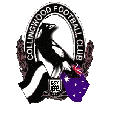


Contact Information
Club Facts
Club Song
Collingwood is a club of two distinct colours, two distinct halves. Black and white, success and despair. By 1937, it had won 11 premierships. In the 64 years since it could only add three more.
If football has a fairytale it is how a club that emerged from the swamp and shanties of an inner suburb 109 years ago transformed itself into a proud powerhouse of the game. It does not matter whether you support Collingwood or not, the facts show that the Pies have occupied a remarkable niche in football since we formally became a nation in 1901.
The Magpies dominated football in the first half of the century -- 11 premierships by the end of the 1936 season -- and completed its image by a series of heartbreaking Grand Final defeats between 1964-1981.
No club rivals Collingwood for that distinctive black and white duality: the all of victory and the nothing of defeat. And the legion of loyal Magpie fans has savoured both. In spades.
The journey started in 1892 when Collingwood played its first game in front of 10,000 fans at Victoria Park. The date was May 9. The opponent, appropriately enough, was Carlton.
"Their colours are black and white in diagonal stripes," The Argus reported of the new club.
"Collingwood although beaten are to be congratulated on playing a fast and fair game, Carlton breaking the rules about twice as often as their opponents all through."
So a tradition and rivalry was established that would grow, wax and wane, but even under the pressure of recent spiritless seasons, would never break.
In the years that followed that first game Collingwood had a catalogue of memorable moments. Some were memorable for all the wrong reasons. Others were triumphs to be treasured as benchmarks of character.
And then there were the white-hot moments when the club's identity was forged anew.
The arrival at Victoria Park of ''Jock'' James McHale -- a Sydney-born boy who played 12 uninterrupted seasons for Collingwood -- was one such moment.
However indestructible McHale might have been as a footballer, it was as a coach that he built the foundation of the Pies' reputation.
He coached Collingwood from 1912-1949, an era that included the Magpies' record four consecutive flags between 1927-30 and the double triumph of 1935-36.
In all, McHale coached his teams to eight premierships and nine second places in 37 years.
The McHale era was Collingwood's highpoint. Never again would an individual and his team exert such a prolonged dominance over the competition.
Such was the potency of the McHale legacy that in 1958 when Melbourne threatened to equal the Magpies' four consecutive premierships, Collingwood snatched the flag from the Demons by three goals to preserve the club's place in history.
This was bravery on a grand scale. Murray Weideman, who later became the Magpies' skipper, recalled: ''The tension and excitement of that last quarter was so great that when I entered the dressingroom I was physically ill.''
That premiership showed how much Collingwood revered its history, a legacy that was worth defending, whatever it cost.
But another era lurked just beyond the 1958 triumph.
It proved to be the age of despair, a defining period for a generation of players and supporters, of unfulfilled promise and wretched lost opportunities.
It started when Melbourne snatched the 1964 flag away from Collingwood by four points, was aggravated by the loss by the smallest margin to St Kilda two years later and became full-blown with the soul-sapping defeat in the 1970 Grand Final against Carlton.
The "Colliwobbles" was born and for the next two decades it became the virus that caused the biggest sickness Collingwood had faced: the should-have-won-but-didn't fever.
But this excruciating period put the last piece of Collingwood's identity in place.
The defining question of the time for the lifelong loyalists was: ''How could we have been so great and yet lost so often?''
So when Collingwood won the flag in 1990 and buried one of sport's greatest hoodoos, the final defining moment in the club's history was achieved.
There was an end to the pain after all. Collingwood could win Grand Finals. The Magpies had emerged from the dark days to shine some light on the trophy cabinet once again.
Of course, the hopes for another dynasty started to rise. But modern football does not allow such unnatural dominance and Collingwood has, at least, proved that a club's history is no guide to its future.
But it is some history, and it is some club.
From an article by Nick Richardson for the 'Herald Sun'

|
|